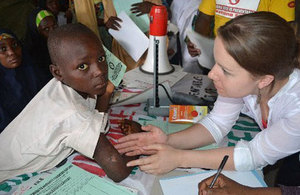Nigerian team aim to tackle sickle cell disease by emulating success of NHS Screening Programme
Last year over 300 babies in England were identified through the screening programme leading to treatment that helps save lives.

A lady examining a young african boy's arm
Nigeria has the largest population of people with sickle cell disease in the world with around 150,000 babies born with this serious condition every year.
The NHS sickle cell screening programme is being used as a ‘gold-standard’ model by a team in Nigeria led by Sickle Cell Cohort Research (SCORE) who hope to emulate its success.
Dr Anne Mackie, Director of Programmes for the UK National Screening Committee, part of Public Health England said:
Last year over 300 babies were identified as having a serious condition through the NHS Sickle Cell and Thalassaemia Screening Programme in England. The programme also invites pregnant women for screening to identify those that may be carrying the sickle cell gene.
Without early identification and prompt treatment these babies would be vulnerable to life threatening infections and other complications.
The blood cells of people with sickle cell disease can get stuck when moving through the blood vessels, stopping the supply of oxygen to parts of the body which can lead to serious complications, such as a stroke or blindness. Treatment, such as antibiotics and education about the disease can help prevent this happening, therefore saving lives.
Dr Baba Inusa, Consultant at Guy’s and St Thomas’ NHS Foundation Trust has been working closely with the NHS screening programme in order to support and assist the implementation of a similar project in the state of Katsina, Nigeria.
Speaking about the Nigerian project, Dr Inusa said:
It is estimated that only 50% of children with sickle cell disease live past the age of 10 in Nigeria, compared to over 96% surviving into adulthood in the UK and the US.
The introduction of this screening programme has been 4 years in the making and has finally come about thanks to the hard work and dedication of a collaboration of people including colleagues from the UK National Screening Committee, from the US and a dedicated task force in Nigeria.
We are now looking to develop and translate many of the excellent UK resources about the condition into Hausa - the local language.
Photo courtesy of Sickle Cell Cohort Research International.